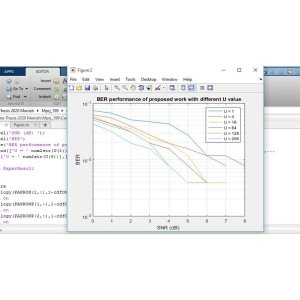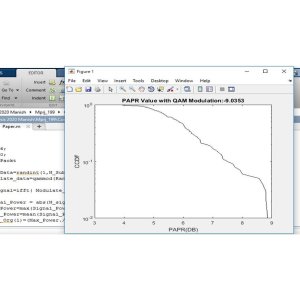PAPR Reduction in OFDM Systems Through Modified SLM-Comp Integration
Problem Definition
The Peak-to-Average Power Ratio (PAPR) in Orthogonal Frequency Division Multiplexing (OFDM) systems has been identified as a significant issue in wireless communications. High PAPR values in OFDM signals lead to challenges such as increased power consumption and complexity in the conversion process between digital and analogue signals. These issues not only affect the efficiency of the system but also have a direct impact on the bit error rate, ultimately impacting the overall performance of the communication system. The problematic PAPR values in OFDM systems highlight the need for research and development in order to address these limitations and improve the performance and effectiveness of wireless communication systems. The use of MATLAB software in analyzing and addressing these issues emphasizes the technical nature of the problem and the need for sophisticated tools and methodologies to tackle the complexities associated with high PAPR in OFDM systems.
Objective
The objective of the project is to address the issue of Peak-to-Average Power Ratio (PAPR) in Orthogonal Frequency Division Multiplexing (OFDM) systems in wireless communication. By combining the Modified Selected Mapping (SLM) technique with Companding, the project aims to reduce the PAPR values, which in turn will lead to improved efficiency of the system. The project will involve analyzing the Bit Error Rate (BER) in OFDM systems to evaluate the impact of the proposed solution. Utilizing MATLAB, the project will implement and test the new system to achieve lower PAPR values and enhance wireless communication efficiency. By integrating SLM and Companding techniques, the project anticipates mitigating the high PAPR issue and enhancing the overall performance of OFDM systems.
Proposed Work
The proposed project aims to address the issue of Peak-to-Average Power Ratio (PAPR) in Orthogonal Frequency Division Multiplexing (OFDM) systems in wireless communication. The high PAPR values in OFDM result in increased power consumption and complexity in digital to analog conversion. By combining the Modified Selected Mapping (SLM) technique with Companding, we aim to reduce the PAPR and improve the overall efficiency of the system. The project will involve analyzing the Bit Error Rate (BER) in OFDM systems to assess the impact of the proposed solution.
The project will utilize MATLAB to implement and test the new system.
By executing a 'memo code' in MATLAB, we will be able to evaluate the PAPR reduction and BER performance of the system in comparison to existing techniques. The primary goal is to achieve lower PAPR values and enhance wireless communication efficiency. By integrating SLM and Companding techniques, we expect to mitigate the high PAPR issue and improve the overall performance of OFDM systems. The project's approach is based on the rationale that by combining these two techniques, we can effectively reduce the PAPR and enhance the system's reliability.
Application Area for Industry
This project can be utilized in various industrial sectors such as telecommunications, broadcasting, and wireless networking. The proposed solutions for reducing the Peak-to-Average Power Ratio (PAPR) in Orthogonal Frequency Division Multiplexing (OFDM) systems address a critical challenge faced by industries in improving power efficiency and reducing complexity in signal conversion processes. By combining the Modified Selected Mapping (SLM) technique with the Companding technique, this project offers a practical and effective solution to enhance the performance and efficiency of OFDM systems. Implementing these solutions can result in lower PAPR values, improved Bit Error Rate (BER), and ultimately lead to more reliable and efficient wireless communication systems across various industrial domains.
Application Area for Academics
The proposed project, focusing on reducing the Peak-to-Average Power Ratio (PAPR) in Orthogonal Frequency Division Multiplexing (OFDM) systems, has the potential to significantly enrich academic research, education, and training in the field of wireless communications. By implementing a new system that combines the Modified Selected Mapping (SLM) technique with the Companding technique, researchers, MTech students, and PHD scholars can explore innovative methods to tackle the challenging issue of high PAPR values in OFDM systems.
The utilization of MATLAB for executing the 'memo code' allows for in-depth analysis of the system's performance in terms of Bit Error Rate (BER) and PAPR reduction. This project can serve as a valuable resource for academics and students looking to delve into research on improving the efficiency and performance of wireless communication systems.
The algorithms employed in this project, including Modified Selected Mapping (SLM) and Companding, offer a practical approach for reducing PAPR levels in OFDM systems.
Researchers and students can leverage the code and literature provided by this project to further their studies in this domain and explore the application of these techniques in real-world scenarios.
This project opens up possibilities for exploring new research methods, simulations, and data analysis techniques within educational settings. By focusing on enhancing the performance of OFDM systems through PAPR reduction, this project contributes to the advancement of wireless communication technologies. Future research can build upon the findings of this project to explore advanced algorithms and strategies for optimizing wireless communication systems even further.
Algorithms Used
The core algorithms used in the project are the Modified Selected Mapping (SLM) technique and the Companding process. The SLM technique is effectively used to reduce the Peak-to-Average Power Ratio (PAPR) in Orthogonal Frequency Division Multiplexing (OFDM) systems, while the companding technique aids in signal optimization, further reducing PAPR levels.
The solution proposed to address the PAPR problem in OFDM systems is a new system that combines the Modified Selected Mapping (SLM) technique with the Companding technique. To test and analyze the system, a 'memo code' is executed through MATLAB. The implemented system examines the Bit Error Rate (BER) in OFDM, combined with PAPR reduction.
A comparative analysis is then carried out with a base paper titled 'PAPR reduction of system, modify SLM with different phase shift'. The designed system is expected to achieve lower PAPR values and more efficient wireless communication.
Keywords
Keywords: Peak-to-Average Power Ratio, PAPR reduction, Orthogonal Frequency Division Multiplexing, OFDM systems, Wireless communications, Modified Selected Mapping, SLM technique, Companding, Bit Error Rate, BER analysis, MATLAB, Signal Optimization, Phase shifting, Power Spectrum Density, Wireless system efficiency, Digital to analogue conversion, Analogue to digital conversion.
SEO Tags
Peak-to-Average Power Ratio, PAPR reduction, OFDM systems, Wireless communications, Bit Error Rate, BER analysis, Modified Selected Mapping, SLM technique, Companding technique, MATLAB simulation, Signal Optimization, Phase shifting, Power Spectrum Density, Research project, Wireless network efficiency, Digital to analogue conversion, Analogue to digital conversion, Comparative analysis, Wireless communication performance.
| Shipping Cost |
|
No reviews found!


















































No comments found for this product. Be the first to comment!